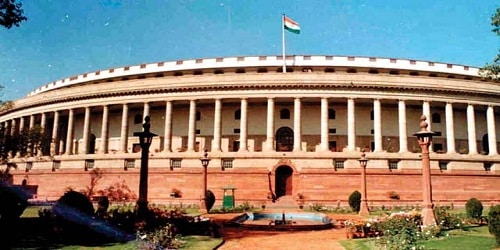On August 2, 2019, Parliament passed Code on Wages Bill, 2019 which replaces the 4 laws- the Payment of Wages Act, 1936, the Minimum Wages Act, 1948, the Payment of Bonus Act, 1965, and the Equal Remuneration Act, 1976. The new bill seeks to regulate wage and bonus payments in all employments where any industry, trade, business, or manufacturing is carried out.
Key Points:
- Background: The Code on Wages, 2019 was introduced in Lok Sabha by the Minister of Labour, Mr. Santosh Gangwar on July 23, 2019 and it was passed by it on July 30, 2019. It was passed in the Rajya Sabha with 85 members in favour and 8 against it.
- Applicability: The new bill will apply to all employees. The central government will make wage-related decisions for employment such as railways, mines, and oil fields, among others and the State governments will make decisions for all other employments.
- Definition of Wages: Wages include salary, allowance, or any other component expressed in monetary terms. It does not include bonus payable to employees or any travelling allowance, among others.
- Floor wage: The central government will fix a floor wage. Before fixing the floor wage, the central government may obtain the advice of the Central Advisory Board and may consult with state governments. The minimum wages decided by the central or state governments must be higher than the floor wage. In case the existing minimum wages fixed by the central or state governments are higher than the floor wage, they cannot reduce the minimum wages.
- Minimum wage fixation: The new bill prohibits employers from paying wages less than the minimum wages. Minimum wages will be notified by the central or state governments.
- Revision of Minimum wage: The minimum wages will be revised and reviewed by the central or state governments at an interval of not more than 5 years.
- Overtime: The central or state government may fix the number of hours that constitute a normal working day. In case employees work in excess of a normal working day, they will be entitled to overtime wages, which must be at least twice the normal rate of wages.
- Payment of wages: Wages will be paid in coins, currency notes, by cheque, by crediting to the bank account, or through electronic mode.
- Wage Period: The wage period will be fixed by the employer as either daily weekly, fortnightly, or monthly.
- Deductions: An employee’s wages may be deducted on certain grounds including fines, absence from duty, accommodation given by the employer, or recovery of advances given to the employee, among others. It should not exceed 50% of the employee’s total wage.
- Bonus: The bonus will be at least 8.33% of the wages, or Rs 100, whichever is higher. In addition, the employer will distribute a part of the gross profits amongst the employees in proportion to the annual wages of an employee. An employee can receive a maximum bonus of 20% of his annual wages.
- Gender discrimination: The new bill prohibits gender discrimination in matters related to wages and recruitment of employees for the same work or work of similar nature.
- Advisory boards: The central and state governments will constitute advisory boards. The Central Advisory Board will consist of employers, employees (in equal number as employers), independent persons, and 5 representatives of state governments. State Advisory Boards will consist of employers, employees, and independent persons. One-third of the total members on both the central and state Boards will be women.
- Offences: The Code specifies penalties for offences committed by an employer, such as paying less than the due wages, or for contravening any provision of the Code. Penalties vary depending on the nature of offence, with the maximum penalty being imprisonment for 3 months along with a fine of up to Rs 1 lakh.
AffairsCloud Recommends Oliveboard Mock Test
AffairsCloud Ebook - Support Us to Grow
Govt Jobs by Category
Bank Jobs Notification




